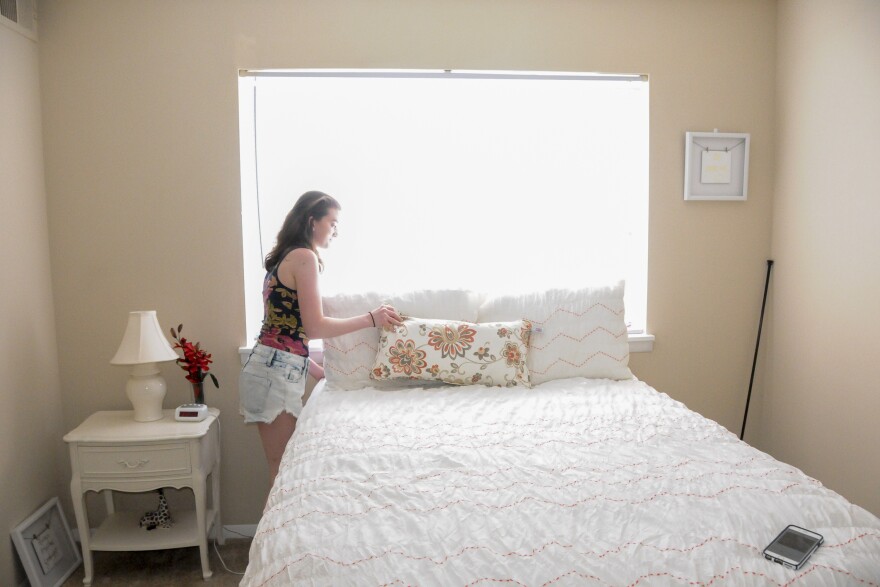This summer, sophomore Anna Clemons spent a really long time trying to find an off-campus apartment.
She visited different complexes with her dad, took notes and made neat lists of pros and cons.
"They're really expensive here," she says. "I don't know how they can afford that, but I can't."
Some of the places were more expensive than the dorms at the University of North Carolina, Chapel Hill, where she's a student. But then she found one that made sense with her budget.
The apartment is simple: fully carpeted, one bathroom and lots of beige.
Most of the furniture in her big, well-lit room is from her childhood. But the dresser is from her mom's childhood, and that's where she keeps a list of everything she buys — down to the $2 shower curtains and the $548 she spent on textbooks.

So, how much does she pay for this two-bedroom apartment that she splits with a roommate?
$415 a month.
In total, she saves at least $1,000 a year by living off-campus. And if she keeps to her budget, she says, she could save hundreds more by packing peanut butter sandwiches and making salads for dinner.
The Cost of Eating And Living On Campus
Over the past decade, room-and-board costs at four-year public universities have gone up roughly 25 percent above inflation. That's according to data from the College Board, which tracks college costs.
"The bottom line is the cost of room and board at colleges have gone up far more than the cost of rooms in the private economy," says Richard Vedder, director of the Center for College Affordability and Productivity.
The total cost of living and eating at UNC Chapel Hill is almost $11,000 a year. Compare that with the University of California, Berkeley, where room and board costs more than tuition, at around $14,000. At The New School — a private school in New York City — it can be more than $20,000 if you live in a single room.
College Board data show that the average cost for room and board at a four-year public institution is $9,804. Average tuition is a bit lower at $9,139 (in state).
Part of the reason why room-and-board charges are up is because electricity and water costs and employee salaries have gone up, says Allan Blattner, director of housing and residential education at UNC Chapel Hill.
Universities also need money to make sure the buildings are in good shape, so students don't trip on broken stairwells or get stuck in elevators.
"We have a building that was built in 1793 that is still an active residence hall," Blattner says. "Obviously that takes some money to keep it moving."
Like a lot of schools, UNC requires that first-years live in a dorm to help build a sense of community and encourage them to do well academically.
Still, every year there are some dorm vacancies, and this semester there are more than 700. So, Blattner and others got creative. They shuffled students around and are temporarily converting two dorm buildings into conference spaces.
"We really wanted to turn lemons into lemonade a bit and see if we can't turn that into a positive thing," he says. "Anything that we can generate revenue on that isn't student rent is a real advantage to students."
Many students end up migrating off campus after their first or second year for a different pace and lifestyle. But the percentage of sophomores living on UNC's campus has gone down over the years from about 70 percent to 63 percent.
Competition From Private Developers
That decline has something to do with the growing number of properties off campus built just for students.
"The student housing market has grown like a weed over the last 25 years," says Randy Shearin, editor of the magazine Student Housing Business.
Shearin says private developers are enticing students with flashy amenities and comforts they expect to see at home.
Some of the luxury apartments target wealthier students, but, depending on the market, some of them can cost less than or as much as dorms.
"In the higher-end student housing, you'll see everything from granite counter tops to resort-style swimming pools," Shearin says. "I've seen pool tables in the living rooms. I've seen putting greens. I've seen batting cages."
But for some students — like Andrea Zuniga — all of those swanky features don't beat the convenience of living on campus, or the feeling of community.
Zuniga, a UNC senior, decided with three of her best friends that they'd live in an apartment-style suite on campus. Unlike the dorms, it comes with a kitchen, two bathrooms and a spacious living room.

The cost? About $800 a month, each. Zuniga says she could've lived in a nice off-campus apartment for $500.
"I know I would've saved a whole bunch of money like all together," she says. "But I just think my life has been a lot about money and budgeting."
The decision to live on campus was also easier because she's on a merit- and needs-based scholarship that covers housing. Plus, she doesn't have to worry about the cost of a car or buying furniture.
Zuniga says she enjoys being able to take a quick bus to the library, or walk to the cafeteria, or — on this night — take a Zumba class with her roommates.
Copyright 2015 North Carolina Public Radio – WUNC





